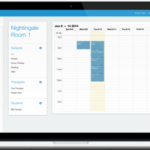 Whilst there has been a recent growth in appreciation for the various talents common in autistic children, with a number of technology companies undertaking recruit drives for those with the condition, it remains something that society tends to try and treat as best as possible.
Whilst there has been a recent growth in appreciation for the various talents common in autistic children, with a number of technology companies undertaking recruit drives for those with the condition, it remains something that society tends to try and treat as best as possible.
These treatments typically include things such as occupational therapy or behavior analysis, which are aimed at improving the life of those with the condition.
What role might big data play? We’ve seen in recent years services such as Ginger.io (which I wrote about here) emerge to offer improved clinical support courtesy of the data we provide it with.
The app mines the data generated by your smartphone usage to determine lifestyle trends that it can then utilize to provide you with health insights and alerts.
In a similar vein is a new service that is deploying big data to try and help those with autism.
Nightingale
The service, called Nightingale, aims to provide a comprehensive decision support tool for clinicians.
The San Francisco based company created the app to hopefully allow clinicians to better understand their patients.
A profile is created for each patient, with each record then being sharable with other colleagues, patients and their relatives.
So far, so standard. Where the service stands out however, is the behavioral data that is collected for each patient. This data, which is collected by caregivers, includes things such as task success or response to interaction.
The data is then analyzed to create a range of visual and anecdotal analytics to help drive insights in real time.
The platform has grown rapidly in the past six months, with the founders enthusiastic about the short-term prospects.
“Back in October, we knew we were on to something but our product was barebones. People liked the platform but we weren’t getting the word-of-mouth traction we expected. So we went to our users and asked what workflows we could build into the product to get them to show it to their friends and colleagues,” they said recently.
The plan is for the service to evolve to the state whereby parents can collect the data as well as clinicians so that the process can begin even before the first appointment with a doctor.
They’re also hoping to work more closely with schools so that children with autism secure better care during their school life. They have recently launched a trial in San Diego with students working alongside therapists int he classroom, with the app used to measure progress.
It’s certainly an interesting service and one that’s well worth keeping an eye on.